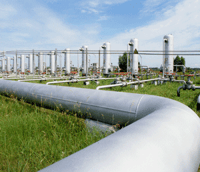 For decades, diesel has been the conventional fuel of choice for industrial and commercial backup generator sets. Largely due to its capital cost advantage and the seemingly unbreakable perception that no other energy source could be as reliable and effective in a scenario requiring backup fuel, diesel has had a firm hold on the market.
For decades, diesel has been the conventional fuel of choice for industrial and commercial backup generator sets. Largely due to its capital cost advantage and the seemingly unbreakable perception that no other energy source could be as reliable and effective in a scenario requiring backup fuel, diesel has had a firm hold on the market.
However, times have changed. As regulations, costs and technologies have evolved, natural gas generators have gained significant popularity in recent years – and with good reason. The challenges that currently impact the energy and power industries are not the same challenges from ten (or even five) years ago, and in many cases, gaseous-fueled generators offer unique benefits to today’s owners, operators and engineers that diesel does not. As a renter or buyer, it’s important to understand these differences, so let’s dig into why the use of natural gas is on the rise.
Challenges Faced by Natural Gas
Overcoming the strong preference for diesel, long-standing champion of the backup power source fuel arena, has been an uphill battle. Here are a few reasons why:
- Despite costs associated with its storage and maintenance, diesel fuel is perceived to be less expensive due to its initial capital cost advantage. According to our friends at Generac Industrial Power, when applied to standby power applications of 150 kWE or more, a diesel-fueled generator delivers a lower capital cost per kilowatt of electricity than a gaseous-fueled generator does. There are also additional engineering costs associated with converting industrial diesel engines to gaseous fuel, making it more difficult to justify changing over.
- A substantial part of the market (in particular, segments with what are considered to be mission-critical applications – like 911 call centers and hospitals) uses diesel-fueled generators, specifically because the code requirements in place mandate the use of fuel that is on-site.
- The ability to easily store diesel fuel on-site is commonly perceived to be increasing the reliability of backup power in non-code-required applications, as well – and conversely, natural gas is often perceived as less reliable when providing backup power in remote areas that do not have easy access to a gaseous-fuel infrastructure.
- Though finding new equipment isn’t so hard, if you’re operating on a tight budget, it can be somewhat difficult to find a used natural gas generator for sale.
4 Reasons Why Natural Gas Generators Are Gaining Traction
1. Increased Reliability – According to the Edison Electric Institute, severe weather events account for 62% of unexpected power outages in the US. These events may lead to the closing of roads and damaging of municipal infrastructures, making it difficult or unmanageable to refuel diesel generators used in a myriad of backup power applications. As a result, the aforementioned reliability issue has really been turned on its head. During intense storms, hurricanes, etc. in the last ten years, natural gas infrastructure – the majority of which is typically underground – has remained unaffected in many instances where diesel delivery was completely interrupted (ultimately causing major problems and delays).
2. Longer Shelf Life – Despite diesel’s on-site maneuverability, natural gas has proven to be easier to store in large reserves over a longer period of time when compared to diesel fuel. Methane and propane, two forms of natural gas, are safer to store and are characterized by a longer shelf life. Diesel is actually far more susceptible to corrosion and contamination by water and biomass. Moreover, the common modern practice to refine diesel by eliminating sulfuric compounds also removes some of the stability elements in diesel fuel which keep it from breaking down. Therefore, storing diesel requires more maintenance and fuel polishing.
3. Decreasing Costs – Although diesel-fuel generators above 150 kWE offer a significant capital cost advantage, the added costs of managing the fuel storage and maintenance (as well as the environmental concerns) begin to even out that notable cost differential. Furthermore, as natural gas resources become more abundant in North America, the prices of this fuel is falling, making natural gas generators an even more appealing option.
4. Environmental Impact – In comparison to diesel or gasoline powered generators, natural gas generators run on relatively clean burning fossil fuels (typically methane or propane). Since there are more stringent regulations and tier standards being put in place as green initiatives take hold worldwide, many companies are looking to substitute diesel with natural gases, which do not face the same emissions standards as their counterparts. With that said, no business or owner wants to be known for leaving a heavy carbon footprint, and natural gas provides a cleaner alternative.
Finally, it’s important to note that as technology has advanced, additional fueling options have become available. The development of bi-fuel generators combines advantages from both sides: the power density and capital cost benefits of diesel with the lengthened runtime of natural gas. Here’s how these machines work…
Bi-fuel generators start up on diesel fuel. As loads are added, natural gas is introduced to the combustion air while the amount of diesel fuel is simultaneously reduced. Typical bi-fuel generators operate at a ratio of 25% diesel and 75% natural gas, with absolutely no reduction in power. Using these generators results in lower emissions, longer runtime, and the ability to use smaller, less costly fuel tanks (which also leave less room for contamination). What’s more, if there is a break in the natural gas supply for whatever reason, the system can convert to 100% diesel without interruption.
All things considered, it’s important to take the time to learn about your genset fuel choices and ensure that the best solution for your business or property is selected. It’s also recommended that you consult the local Authorities Having Jurisdiction (AHJs) to understand any relevant policies about using particular fuels in your given situation.
Sources: Understanding Natural Gas Fuel Reliability for Backup Power, Generac Industrial Power and Gaseous Fuel Genset Solutions Becoming More Affordable, Greener, Generac Industrial Power





